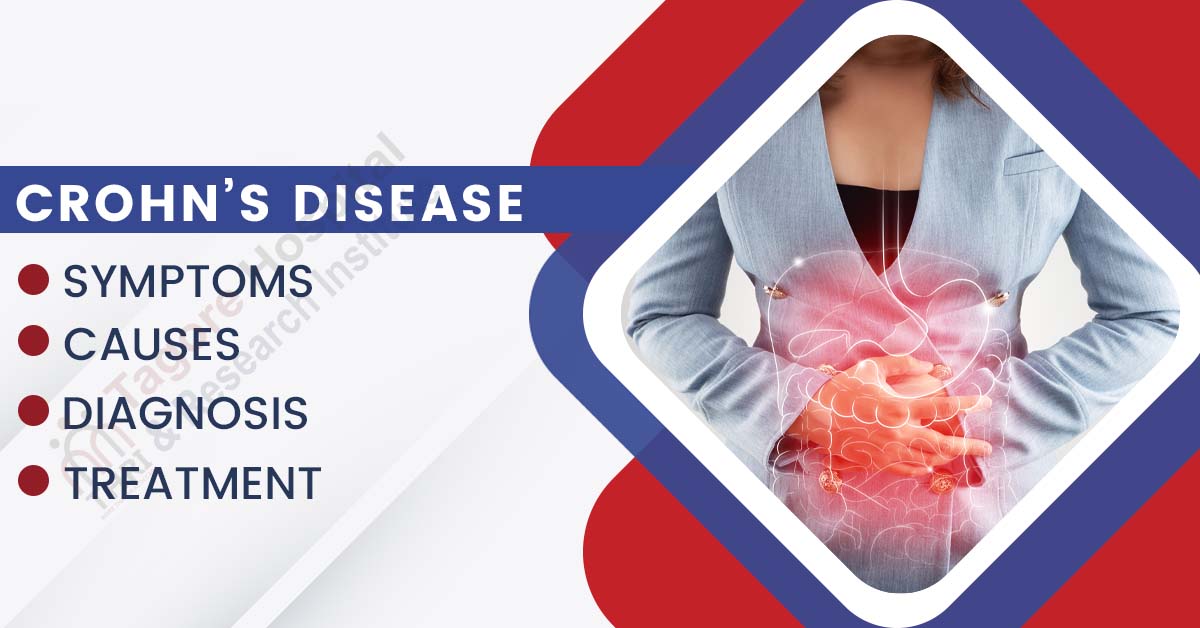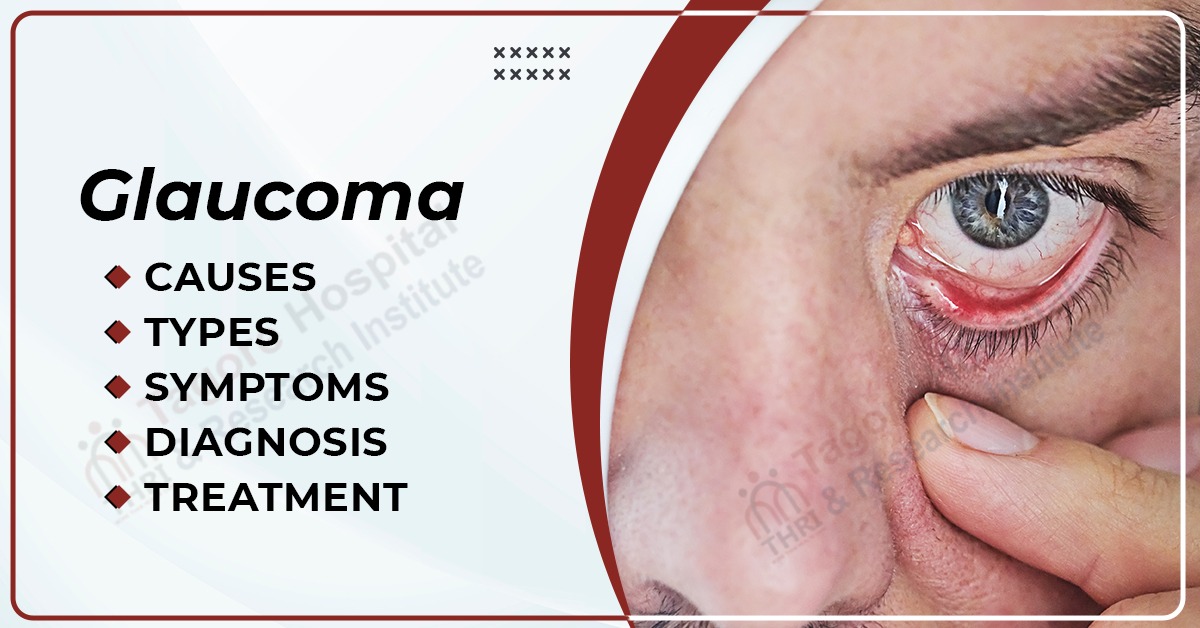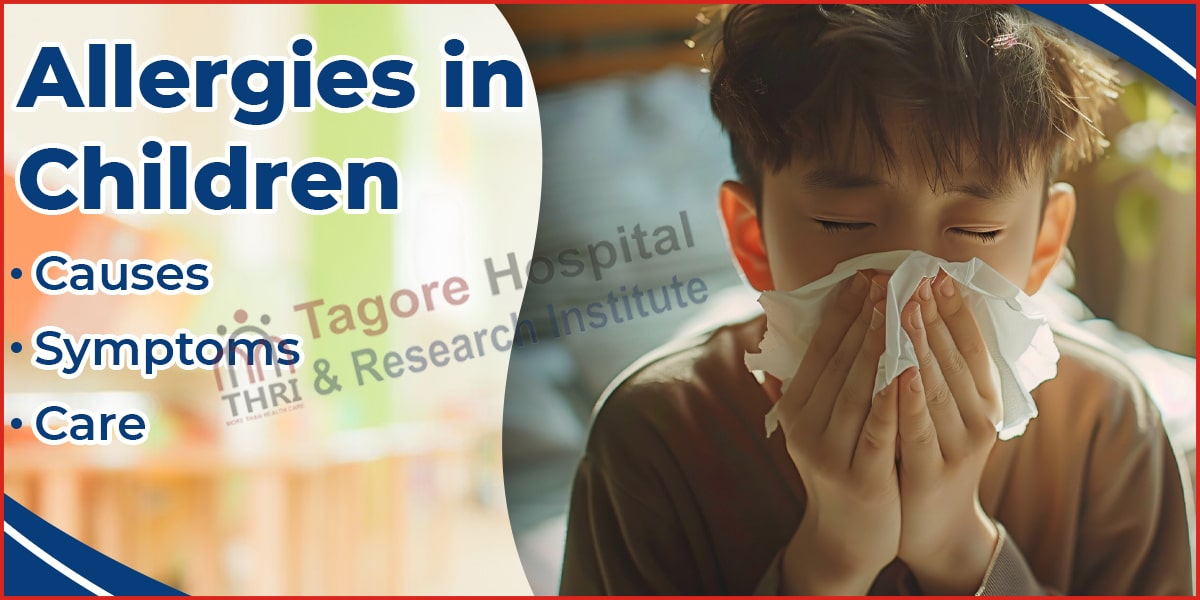- By THRI admin
- Posted February 28, 2023
Crohn's disease is an example of an inflammatory bowel disease (IBD) that enlarges and irritates the digestive tract. Crohn's disease symptoms include abdominal pain, diarrhea, weight loss, and rectal bleeding.
There is no treatment for this lifelong condition. Treatments, however, usually aid in symptom management and permit you to lead an active lifestyle.
What is Crohn’s disease?
Inflammatory bowel disease, also known as IBD, is a group of illnesses that includes Crohn's disease.
An inflammatory condition caused by the immune system is Crohn's disease. This indicates that the immune system attacks the body's cells because it believes they are dangerous, even though they are not.
Any GI tract organ, including the mouth and the anus, can be impacted by Crohn's disease. The intestinal system is where symptoms are most prevalent, but they can also impact the skin, joints, bones, eyes, kidneys, and liver.
Types of Crohn’s Disease:
Crohn's disease can be classified into five main subtypes, each with a unique set of signs and symptoms. The location of inflammation in your gastrointestinal tract (GI tract) is how doctors categorize each type:
- Ileocolitis: An inflammation of the ileum, the small intestine's last section, and a portion of the colon, the large intestine.
- Ileitis: An inflammation of the ileum, the last part of the small intestine.
- Gastroduodenal Crohn’s: Inflames the beginning of the small intestine and the stomach (duodenum).
- Jejunoileitis: An Inflammation in the middle part of the small intestine (jejunum).
- Crohn's (granulomatous) colitis: An Inflammation of only the colon.
Symptoms of Crohn’s Disease:
The chronic inflammation and irritation of the gastrointestinal system are what cause Crohn's disease symptoms. Everyone who has Crohn's disease has a unique experience with it.
Symptoms might range from minor to severe. In reality, their severity may vary within a single person. These signs and symptoms, which can be minor to severe, are:
Common symptoms of Crohn’s disease:
The following widespread symptoms are frequently experienced by people with Crohn's disease:
- Cramps and pain in the lower right quadrant of the abdomen are common.
- The possibility of having bloody or pus-filled diarrhea
- Loss of weight
These signs and symptoms, which can be mild to severe, are:
- Anemia
- Stool with blood in it (the blood may be red or tarry and black)
- Pain and swelling (uveitis) in the eyes
- Children who do not thrive are characterized by slow growth and the emergence of severe Crohn's disease.
- Fatigue
- Fever
- Perianal abscess
- Poor appetite
- Joint pain
- Nutritional deficiencies
- Constipation discomfort
- Weight loss
Other signs and symptoms include mouth sores, rectal bleeding, osteoporosis symptoms, or indications of kidney or liver diseases like cirrhosis or hepatitis.
Read also: Symptoms of PCOS
Causes of Crohn’s Disease:
It is unclear what exactly causes Crohn's disease. It might be brought on by an autoimmune response. Some evidence suggests that the immune system inadvertently targets healthy bacteria that naturally flourish in the human gut.
A person's risk for the disease is thought to be influenced by both genetic and environmental factors, according to experts.
Some risk factors or causes for Crohn's disease include:
- Genes. While it is impossible to pinpoint a single gene as the origin of Crohn's disease, more than 200 genetic variations have been found to increase the risk, according to MedlinePlus.
- Family History. It seems that Crohn's disease runs in families. The Crohn's and Colitis Foundation estimates that 5 to 20% of individuals with Crohn's disease have a parent or sibling who also has the condition.
- Your chance of getting Crohn's is between 7 and 9% if one of your parents has the condition. However, the National Human Genome Research Institute reports that if both of your parents are affected, your risk is much higher — about 35%.
- Where You Live. The prevalence of Crohn's disease is higher in developed nations than in developing ones. It also occurs more frequently in cities than in rural areas.
- Cigarette Smoking. Smokers are more likely to develop Crohn's disease.
- Certain Drugs. Aspirin, ibuprofen (Advil, Motrin), and naproxen (Aleve) are examples of nonsteroidal anti-inflammatory drugs (NSAIDs) that may slightly increase your risk of developing Crohn's disease. Other NSAIDs include antibiotics, birth control pills, and NSAIDs.
Diagnosis of Crohn’s Disease:
Most Crohn's patients visit a medical professional for the first time due to persistent diarrhea, abdominal cramps, or unexplained weight loss. Make an appointment with your pediatrician if your child has been exhibiting Crohn's disease symptoms.
Your doctor might suggest performing one or more of the following tests to determine the cause of your symptoms:
- Blood test: A blood test looks for an abundance of white blood cells, which could signify infection or inflammation. The test also looks for anemia, which is a low red blood cell count. Anemia affects roughly one in three people with Crohn's disease.
- Stool examination: In this examination, a sample of your stool is examined to look for bacteria or parasites. It can eliminate infections that lead to persistent diarrhea.
- Colonoscopy: A colonoscopy is a procedure where a thin tube with a camera and light attached is used by your doctor to look inside your colon. Your doctor might perform a colon biopsy to obtain a tissue sample to examine for signs of inflammation.
- CT scan: A CT scan produces images of the gastrointestinal tract. It provides information about the level of intestinal inflammation to your doctor.
- Upper GI endoscopy: During this procedure, your doctor inserts a long, thin tube known as an endoscope into your throat through your mouth, your doctor has access to the interior thanks to an attached camera. Additionally, your doctor might take tissue samples throughout the upper endoscopy.
- Upper GI examination: Using X-ray images, your doctor can see how your digestive tract is working as a barium liquid is swallowed.
Prevention of Crohn’s Disease:
You must choose a few measures that are advised by experts if you want to protect yourself from Crohn's disease. This will help to lower the risk of developing Crohn's disease. The following are some helpful measures to ward off Crohn's disease.
- Stop smoking: Smoking lowers the intestine's natural defense, which interferes with the blood flow to the intestines. Inflammation results from the immune system is severely altered by this.
- Control your stress: Stress is extremely harmful to your health, especially if you have certain diseases like Crohn's.
- Choose a Healthy Diet: People with Crohn's disease should choose a healthy diet that includes vegetables, fruits, and cereals, all of which have numerous health benefits. High-fat foods must be completely excluded from our diet.
- Exercise: Regular exercise helps us stay healthy and, when combined with a balanced diet, can lead to long-term improvements in health.
Complications of Crohn’s Disease:
Crohn's disease may result in severe side effects, such as:
- Abscesses: Infected, pus-filled pockets develop in the stomach or other parts of the body.
- Anal fissures: Tiny tears in the anus, also known as anal fissures, can hurt, itch, and bleed.
- Bowel obstructions: Fistulas, a narrowed intestine, or scar tissue from inflammation can all completely or partially block the bowel. Gases and waste material accumulate. Surgery is necessary for a small or large bowel obstruction.
- Colon cancer: The risk of cancer is increased by Crohn's disease of the large intestine.
- Fistulas: Fistulas, which are irregular tunnel-like gaps in the intestinal walls, can develop as a result of IBD. Sometimes these fistulas become infected.
- Malnutrition: Prolonged diarrhea can hinder your body's ability to absorb nutrients. Lack of iron is one of the most typical issues among Crohn's patients. Anemia (low red blood cell count) can result from too little iron when your organs aren't getting enough oxygen.
- Ulcers: Ulcers can develop in the mouth, stomach, or rectum. Ulcers are open sores.
When to See a Doctor?
Consult a physician if you experience consistent changes in your bowel habits or any of the following signs and symptoms of Crohn's disease:
- Abdominal pain
- Stool containing blood
- Vomiting and nauseous
- More than two weeks of continuous diarrhea
- Loss of weight without cause
- Fever in addition to any of the previously mentioned symptoms
Treatment of Crohn’s Disease:
Although there is no known cure for Crohn's disease, there are treatments that can reduce intestinal inflammation, ease symptoms, and guard against complications.
Medications, bowel rest, and surgery are all forms of treatment. Each person responds differently to treatments. The best course of treatment for you can be determined in collaboration with your healthcare provider:
- Numerous medications that reduce inflammation are available for Crohn's disease. Some of these medications accomplish this by lowering your immune system's activity. Additionally, medications like nonsteroidal anti-inflammatory drugs and anti-diarrheal medications can help with symptoms or side effects. Antibiotics might be necessary if your Crohn's leads to an infection.
- Intestinal rest entails refraining from eating or drinking anything, or simply consuming specific liquids. Your intestines can rest as a result. If your Crohn's disease symptoms are severe, you might need to do this. You can consume liquids, feed yourself with a feeding tube, or get nutrients intravenously (IV). You could be able to perform bowel rest at home, or you might need to do it in the hospital. It could last a few days or perhaps a few weeks.
- In situations where other treatments are not effective enough, surgery can treat complications and lessen symptoms. During the procedure, a damaged section of your digestive tract will be removed to treat
- Fistulas
- An emergency bleeding situation
- Obstacles in the intestines
- Adverse drug reactions that put your health in danger
- Symptoms when medications fail to treat your illness
Tags





